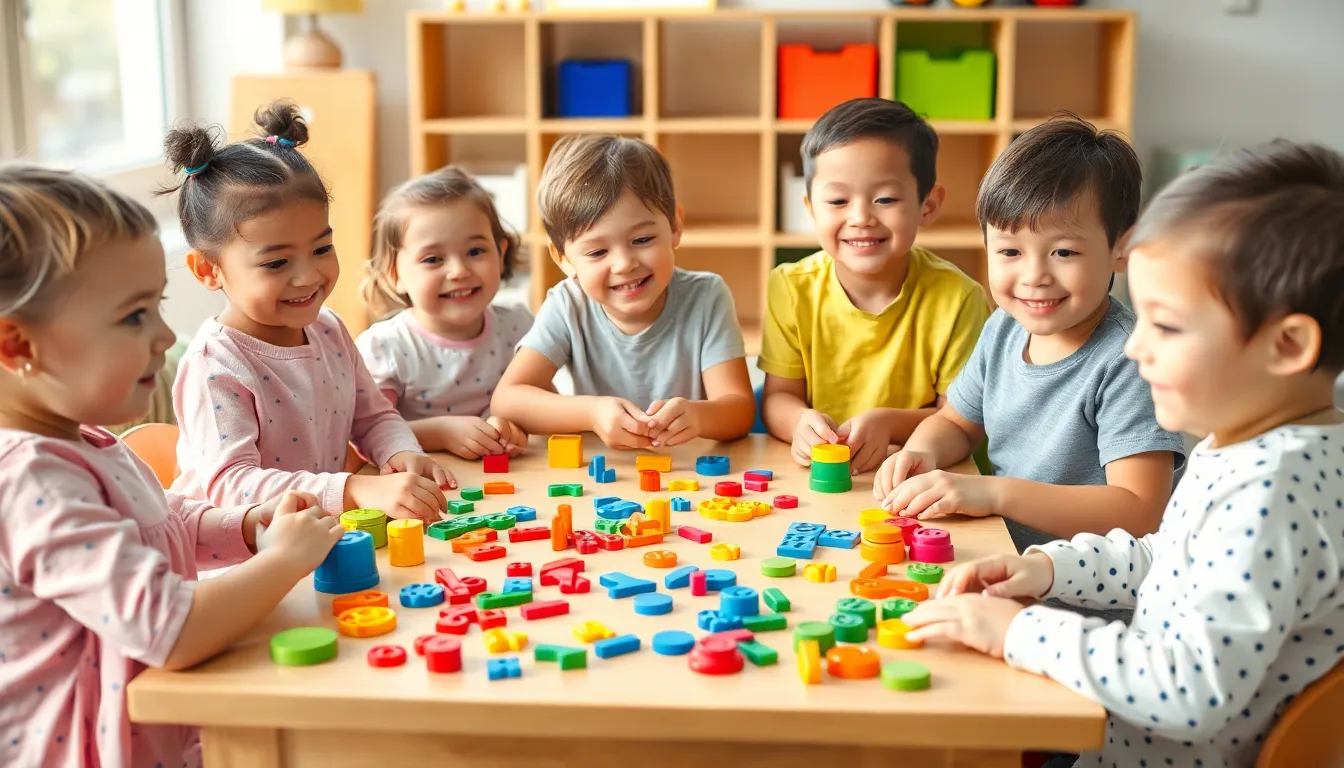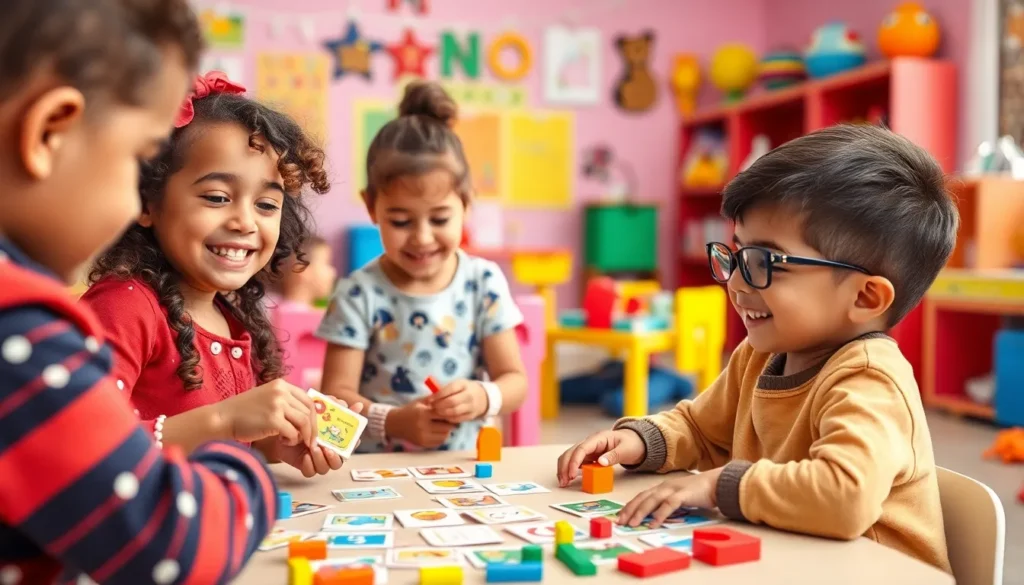Table of Contents
ToggleIn a world where kids are glued to screens, finding engaging ways to teach them can feel like searching for a unicorn. Enter preschool learning games—those magical tools that turn learning into a fun adventure. These games not only spark curiosity but also help little ones develop essential skills while laughing all the way to the learning bank.
Overview of Kids Preschool Learning Games
Kids preschool learning games foster engagement and curiosity through interactive play. These games encompass various activities that promote fundamental skills like counting, language development, and problem-solving. Incorporating colorful visuals and playful characters captures children’s attention and enhances their learning experience.
Typically, preschool learning games include puzzles, matching games, and memory challenges. Each type serves a unique purpose, such as boosting cognitive abilities or improving fine motor skills. Learning through play allows kids to explore concepts in an enjoyable environment, reducing stress and promoting retention.
Educational games are available in both physical and digital formats. Online platforms feature interactive games that adapt to individual learning paces. Meanwhile, traditional board games encourage social interaction and foster collaborative skills among peers.
Moreover, structured playtime through these games facilitates the development of essential life skills. Skills like sharing, patience, and teamwork emerge naturally during gameplay. Parents and educators observe significant improvements in attention spans and critical thinking skills as children engage with these entertaining tools.
Using preschool learning games effectively requires selecting activities appropriate for specific age groups and developmental stages. Games targeting pre-reading and pre-math skills are particularly beneficial in nurturing foundational knowledge. Evaluating children’s responses and adapting game choices enhances overall learning experiences.
Kids preschool learning games serve as powerful resources that blend education and play seamlessly. These games inspire young learners while building vital skills, making learning an exciting adventure.
Benefits of Learning Games for Preschoolers

Learning games offer numerous advantages for preschoolers, enhancing both cognitive and social skills through playful engagement.
Cognitive Development
Cognitive growth occurs as children interact with preschool learning games. Games that focus on counting and matching foster numerical understanding, laying the groundwork for future math skills. Engaging in puzzles stimulates critical thinking, encouraging problem-solving abilities. Language development receives a boost from interactive games that promote vocabulary enrichment and comprehension. Bright visuals attract attention, making concepts easier to grasp. Children develop confidence as they accomplish tasks within these games. Enhanced memory and attention span emerge over time. Incorporating various types of games helps cultivate a well-rounded cognitive skill set.
Social Skills Enhancement
Interactions through learning games significantly improve social skills among preschoolers. Collaborative play requires children to share, take turns, and communicate effectively with peers. Engaging in group activities teaches empathy and patience, important values in social settings. Learning to work as a team during games fosters cooperation, making it easier for children to relate to others. Opportunities for role-playing within certain games help preschoolers understand different perspectives and emotions. Ultimately, these experiences build strong foundational social skills that carry into later years, preparing children for various social interactions.
Types of Kids Preschool Learning Games
Preschool learning games come in various engaging formats that cater to different learning styles. Each type plays a unique role in enhancing a child’s educational experience.
Educational Board Games
Educational board games encourage interactive play through captivating themes and objectives. They often focus on skills like counting, word recognition, and critical thinking. Games such as “Candy Land” teach color recognition, while others like “Chutes and Ladders” promote counting and game strategy. Playing these games in groups fosters social skills, as children learn to share, take turns, and communicate effectively. Game nights also create opportunities for family bonding, enhancing the overall learning experience.
Digital Learning Apps
Digital learning apps offer interactive experiences that adapt to a child’s learning pace. Applications like “Endless Alphabet” and “Starfall” engage preschoolers with colorful graphics and sound effects, capturing their attention. These apps focus on essential skills, including letter recognition, counting, and basic problem-solving. Many provide progress tracking tools, which help parents assess development. Interactive elements keep children motivated, ensuring that learning remains fun and engaging in a digital format.
Outdoor Educational Activities
Outdoor educational activities combine physical movement with learning opportunities. Nature scavenger hunts allow children to explore environments while learning about shapes, colors, and numbers. Activities like building with natural materials enhance fine motor skills and creativity. Group games such as relay races promote teamwork and social interaction. Each outdoor experience enriches a child’s understanding of their surroundings while offering fresh air and exercise, which are vital for overall development.
Tips for Choosing the Right Learning Games
Selecting age-appropriate learning games greatly impacts educational outcomes. Parents and educators should consider the developmental stages of children. For instance, preschoolers benefit from games designed for early learners that focus on basic concepts like colors and shapes. Understanding children’s cognitive abilities helps ensure the game aligns with their interests and challenges.
Assessing the educational value of games is essential. Quality preschool learning games should promote essential skills such as counting, language development, and problem-solving. Look for games that not only entertain but also provide opportunities for learning. Engaging visuals and interactive elements further enhance understanding, making it easier for kids to grasp new concepts. Choose games that encourage critical thinking and foster collaboration among peers, as these experiences contribute to a well-rounded education.
Popular Kids Preschool Learning Games
Various preschool learning games capture children’s interest and support their development. Some popular options include:
- Puzzles: These games enhance problem-solving skills and fine motor abilities. With varying difficulty levels, puzzles cater to different ages and skill sets.
- Matching Games: Such games promote memory retention and visual recognition. They often involve colorful cards featuring animals, shapes, or numbers, making learning interactive and fun.
- Memory Games: Designed to improve cognitive abilities, these games challenge children to recall card placements. Engaging graphics and themes keep kids motivated.
- Board Games: Classic educational board games, like “Candy Land” and “Chutes and Ladders,” blend fun with skill development. They focus on counting, colors, and social interaction.
- Digital Learning Apps: Interactive apps, such as “Endless Alphabet” and “Starfall,” appeal to tech-savvy children. These applications adapt to individual learning paces while providing captivating visuals.
- Outdoor Activities: Games like nature scavenger hunts and relay races enhance physical coordination and teamwork. Combining outdoor play with educational elements nurtures well-rounded development.
Parents and educators can utilize these games to tailor learning experiences. Selecting age-appropriate activities ensures that children engage with suitable challenges. Monitoring children’s progress can inform future game choices and maximize their learning outcomes.
These diverse options support preschoolers in acquiring essential skills while making learning enjoyable. Engaging games foster a love for education, creating a solid foundation for future academic success.
Kids preschool learning games play a crucial role in shaping young minds. By combining fun and education these games not only captivate children’s attention but also foster essential skills. Engaging in various activities helps develop cognitive abilities while promoting social interactions.
Parents and educators can maximize the benefits of these games by selecting age-appropriate options tailored to children’s developmental stages. The right mix of digital and physical games encourages exploration and collaboration enhancing the overall learning experience.
Ultimately preschool learning games create a vibrant learning environment that inspires curiosity and a love for learning. With the right approach these tools can transform education into an exciting adventure for every child.





